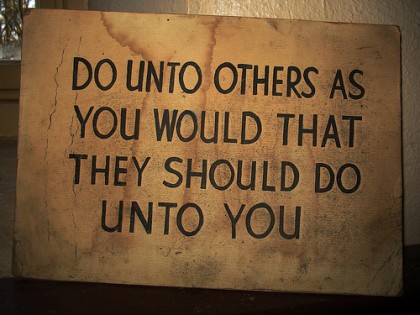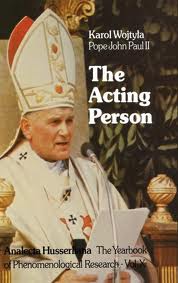Back and Forth
Devra Torres | Nov 18, 2012 | 2 cmts
“We are here to serve others,” the apocryphal mother explains.
“Well, then,” responds the little apocryphal boy, “What are the others here for?”
* * * *
No wonder he’s confused. Which are we supposed to be, self-centered or other-centered?
Well, you might say--both.
When you read the Bible, you keep running into principles like

and
“With what measure you measure, it will be measured to you”
and, of course,

There’s a common thread here: they keep on drawing you not simply towards others, but back and forth from your own desires, obligations and actions to everybody else’s. They keep reminding you to acknowledge the personhood, the interiority, the subjectivity, of both the other and the self.
There’s room for self-realization and the generosity of altruism.
These principles draw on a startling discovery that nearly every kid of a certain age makes: All those other people out there are to themselves what I am to myself!

It’s a truism that babies and children assume they’re the center of the universe.

They’re not being consciously selfish, just honestly oblivious to the subjectivity of others. Their self eclipses everyone and everything else.
Other people—for instance, affectionate relatives—

may certainly be of interest, but they’re perceived as accessories, not subjects in their own right. Even to older children, the idea that God could be just as interested in the details of other people’s lives as He is in one’s own seems bizarre.
But even after you’ve grasped that other people are subjects, too, principles like the Golden Rule can keep you reminded. (Temporal beings require lots of reminding.)
The striking thing about these principles is how person-centered and un-arbitrary they are.

Of the Ten Commandments, the first-tablet ones instruct us on how to treat a personal God; the second-tablet ones, on how to treat other persons. Yes, big-picture consequences, like social harmony or chaos, will ensue. Structures and institutions will be set up one way or the other.

But these meta-personal realities are not the immediate point.
Various ancient peoples did worship gods and goddesses whom they pictured as persons. But that was different:

Zeus, for instance, would step in to make demands of mortals, but it was out of jealousy or caprice, not concern for the human person. The true God commands us to avoid evil “not,” as Simcha Fisher puts it, “because [He] is bossy, but because sins are bad for us.”
It’s not just that obedience is beneficial to persons, though. What I’m trying to put my finger on is something different—something about the way the commandments require us to shift back and forth between ourselves and others.
Consider what happens when I ask myself:
Do unto him what I’d want done unto me? What would that be, exactly? The measure I’m measuring with? Is it a generous measure, or miserly, or too harsh? Is it cynical, or merciful? What if someone made the same assumptions about me that I’m making about that guy? How would I react if someone treated me with such grudging, marginal justice? Or with overflowing generosity? Do I really know what makes that lady tick? What if she assumed she knew what makes me tick? What does make me tick?
I’m forced to consider both the other as subject and myself as object—or, at least, myself from the point of view of someone who doesn’t happen to be me.
When you’re thinking this way, you’re going beyond benevolence and altruism: you’re groping towards some kind of union with the other person. You’re acquiring self-knowledge, but you’re not getting mired down in introspection. You’re developing the self, but without being trapped within egotism.
John Paul the Great says it all way, way better,

But one thing for sure: the answer to what both we and others are "here for" is far more interesting than either “selfishness” or “altruism.” We do need to be able to put ourselves in the other’s shoes, but, more than that, we're destined to inhabit together the communio personarum--a place so bizarre and fascinating that only God could have come up with it.

Comments (2)
Katie van Schaijik
Nov 24, 2012 9:37pm
Devra, this is a great post.
It seems to me ever-clearer that the double mark of a mature person is 1) to recognize the subjectivity of others and 2) to stand in one's own. Others are not extentions of our own ego, neither are we extensions of theirs. Each is his own, unrepeatable, irreplaceable self.
I like very much, too, this point:
We need to go beyond benevolence and altruism, toward union. Worth pondering.
Jules van Schaijik
Nov 25, 2012 9:54am
Devra, your opening lines remind me of W.H. Auden's description of "the conceit of the social worker":
I'm trying to understand more precisely why Auden considers this a conceit. Is it because the social worker thinks of himself as other-centered but of those he helps as self-centered? Is it because the social worker is more impressed with his own virtue than with the other person's needs?